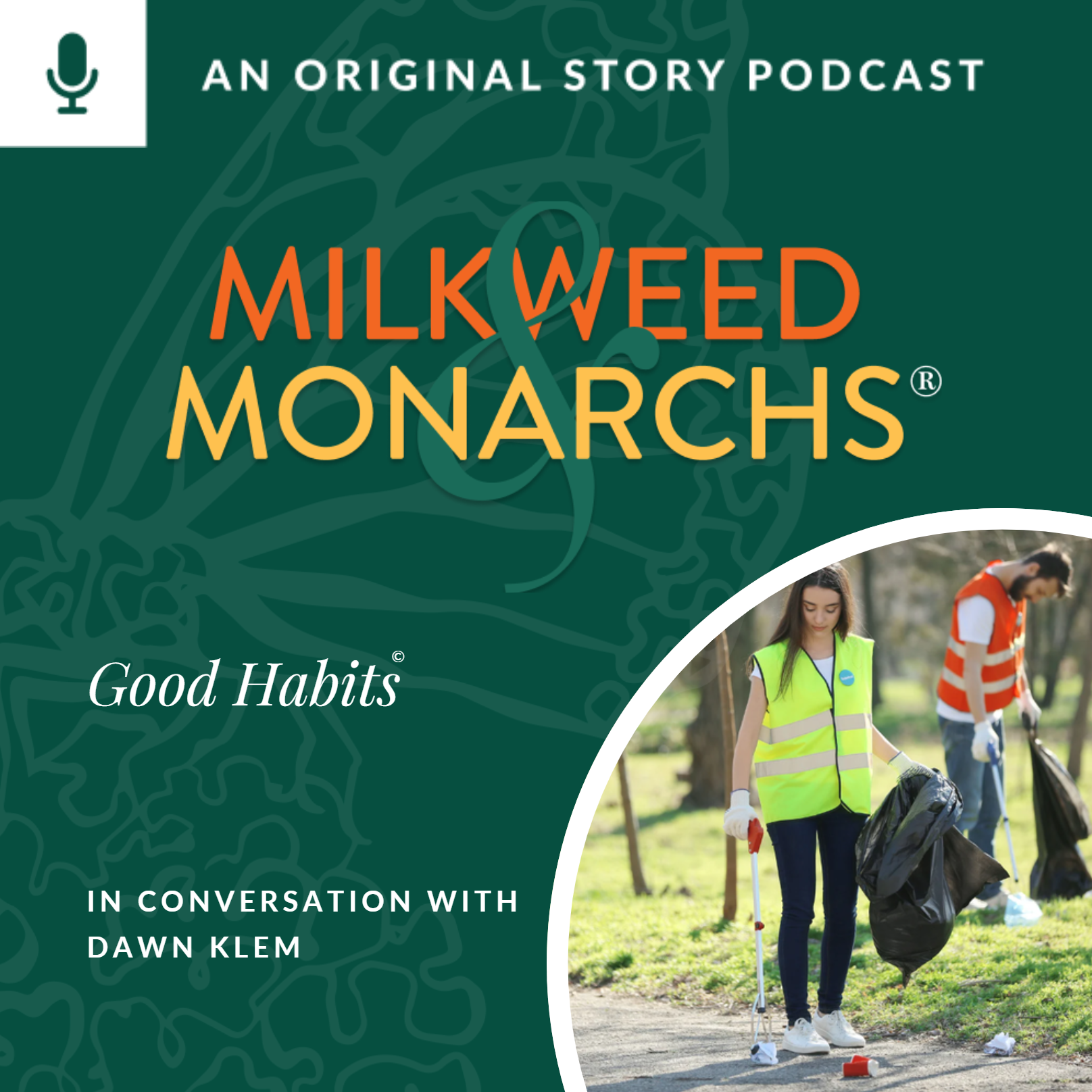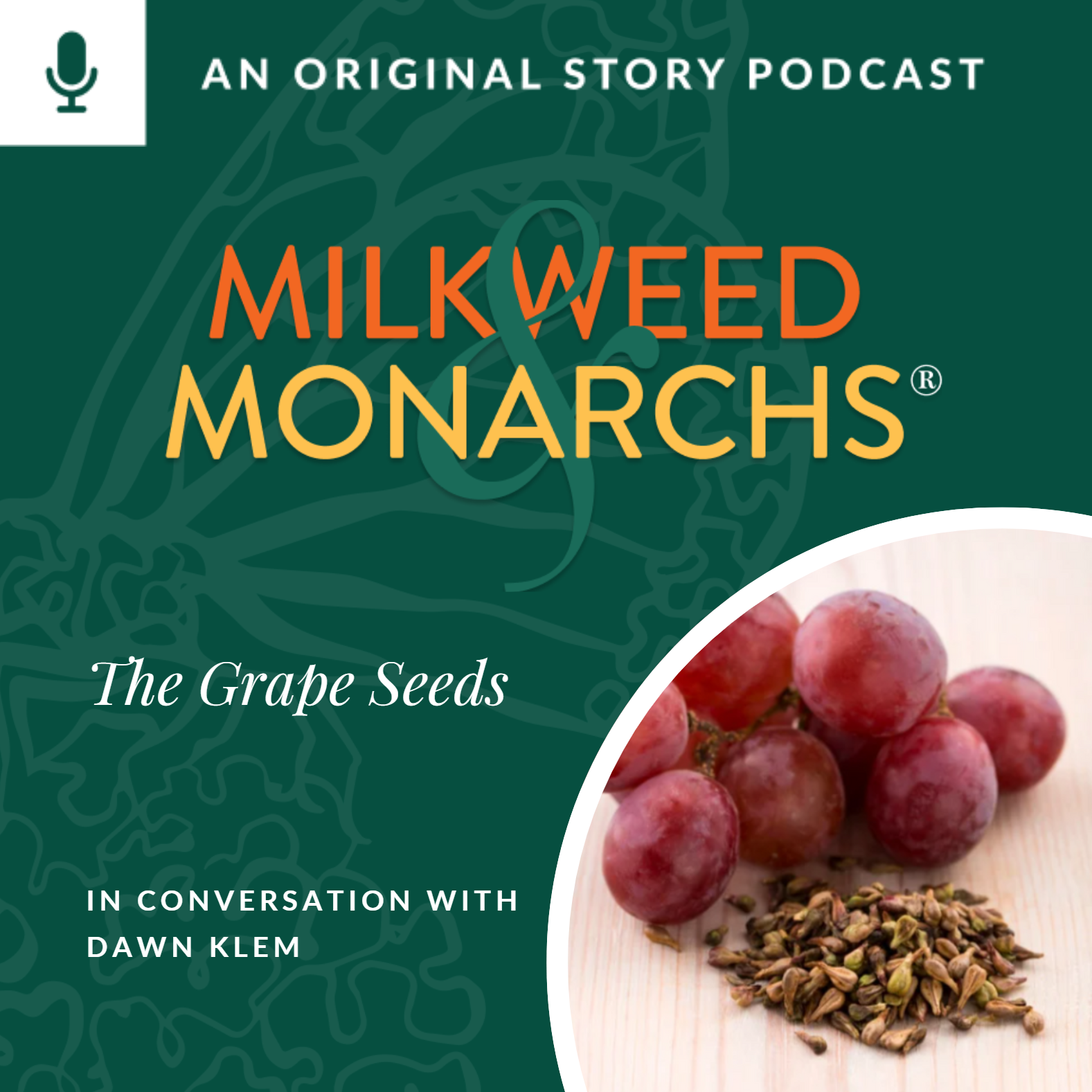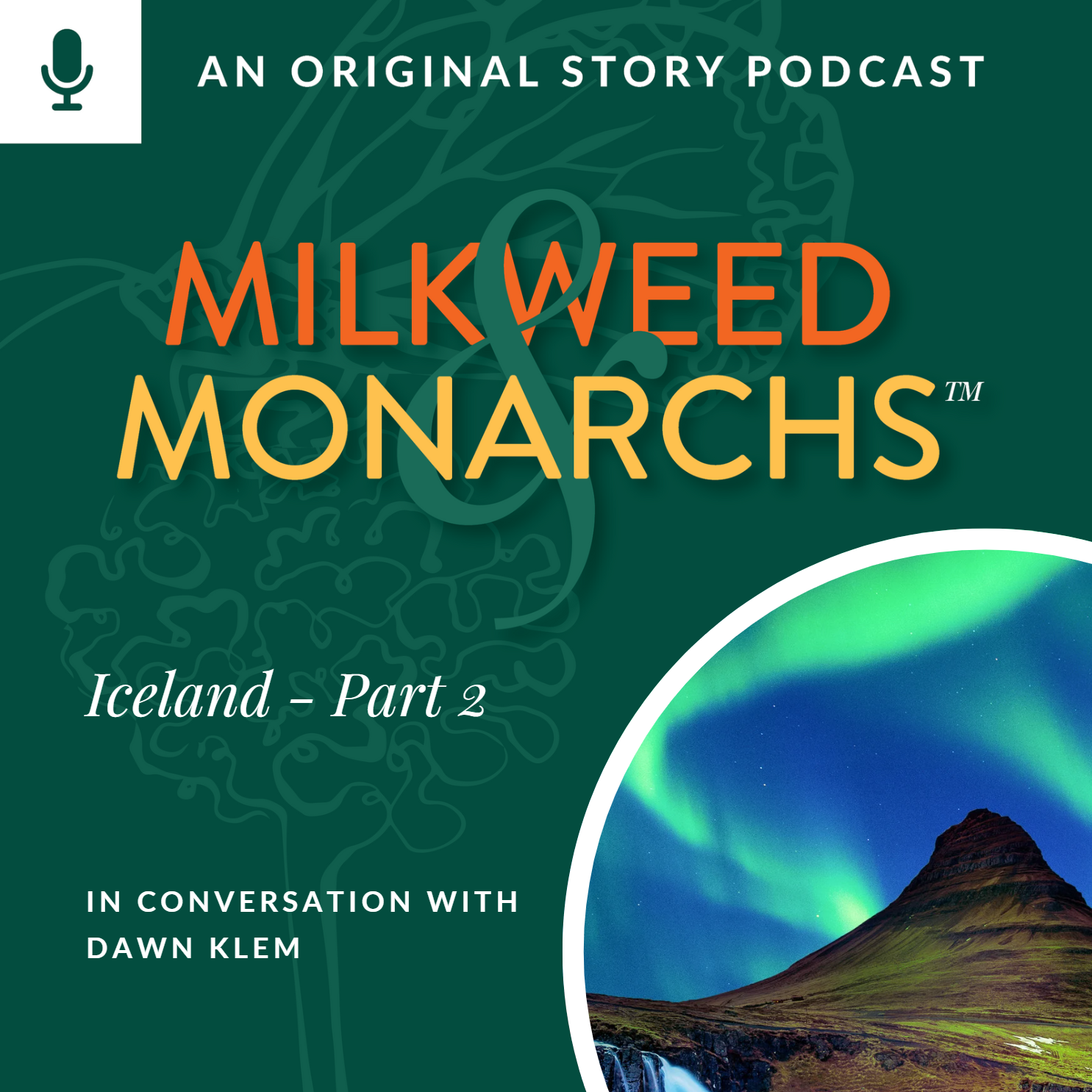Episode Transcript
[00:00:01] Hi, everyone. This is dawn clam, and you are on my podcast, Milkweed and monarchs today. I really thought about my dad a lot.
[00:00:14] My dad was a huge influence in my life.
[00:00:20] A great influence.
[00:00:23] He died in 2001.
[00:00:30] He actually died on 911, 2001.
[00:00:39] He had been having heart troubles, and he was in the hospital, and I'll never forget it for as long as I live. He was in the hospital in Ohio, and I was living in Maine. And my husband and I had gone back to see how he was doing, and he was doing okay. Like, he had crossed the corner. He had turned the corner, as they say, and he was improving. And so we made the decision to go back to Maine.
[00:01:18] And when we got back to Maine, I had called him to see how he was doing, and he said to me, I think you left too soon.
[00:01:29] I'm not doing that great. And I could tell he was struggling. He was struggling to breathe, so I was concerned.
[00:01:39] But we were so exhausted when we get home that we decided to, you know, just go to bed, and I could check in with him in the morning.
[00:01:50] He had been diagnosed with a lung tumor and had decided to have a lobectomy, one of his lobes removed from his left lung. And I, as a nurse, was very.
[00:02:09] And I was an oncology nurse, was not too overjoyed about that idea.
[00:02:16] But he felt comfortable. And one of my aunts was married to a doctor, and he felt like it was the right thing to do. So they made the decision that he was going to go ahead and have surgery.
[00:02:36] And he did do well. In the beginning, he did great, but it was probably a couple days after surgery, or even maybe five days, and he turned the corner, and he wasn't doing so great. So I had already left because he was stable.
[00:02:57] And my husband and I drove back to Maine where we were living. And I'll never forget it, because I had called the hospital to talk to him, and he said, I'm struggling, and I think you might have left too soon. And, boy, was that hard to take, right?
[00:03:18] You're trying to do the best you can. I mean, I had my own life, but I also wanted to be there for my dad.
[00:03:28] So the next day, after we got home, I was still in my pajamas. I wasn't ready to go back to work yet. I think I had another couple days off, and I was in my pajamas, and I had turned on the tv, and when I turned on the tv, I turned it on just in time to see a plane crash into the World Trade center.
[00:04:03] And at the time that it happened, the newscaster was saying, I don't know, maybe the sun was too bright and they couldn't understand where they were at. And I'm like, what the heck is going on? It was so strange to me. And at the same time, my telephone range. And I answered the phone, and the nurse was on the other end of the phone from the hospital where my dad was in Fort Wayne, Indiana. And she said, your dad's not doing very well. His potassium is really high. He's not breathing. If I were you, I would get in the car and come back now, because I don't think he's going to make it. And I was like, oh, my God. I was just in a state of shock. First I'm watching the World Trade center, and then I'm hearing about my dad. It was like a crash, an emotional crash, all at the same time.
[00:05:13] I'm never, ever gonna forget that moment.
[00:05:16] Never.
[00:05:19] So then, as the day went on, we found out that we had been attacked in the US.
[00:05:31] And there it was not just someone who was blinded by the sun. It was a deliberate act to crash into the world trade center. And you heard everything else about 911, and it was just absolutely awful.
[00:05:51] And we were not allowed. We could not get on a plane to go back to see my dad. We could not travel from Maine through New York back to Ohio to see my dad.
[00:06:07] We couldn't get back to see my dad. That was just the end of it.
[00:06:12] And two days later, my dad did die, and I could not be there because we were in the middle of this political crisis in our country.
[00:06:33] I cannot. I mean, it's been 23 years now, and I can finally talk about it with a level head, but at the time and for years afterwards, it just ate me alive.
[00:06:51] I mean, my dad was everything to me. And not being able to get back there to see him was just the biggest devastation that you can imagine. It was just more painful than I can even tell you. Just absolutely awful.
[00:07:18] But it's been 23 years now, and I feel like I can talk about my dad and really tell you the story about my dad. My dad was one of a kind. He wasn't your typical dad in any way. He's definitely different. I think I took my cue from him because I'm not necessarily like everybody else, and neither was my dad.
[00:07:51] He was born to my grandma and grandpa. My grandpa met my grandma in prison.
[00:08:01] I mean, that's a big start right there, right? My grandpa's parents immigrated to the US through Ellis island from Italy in the early 19 hundreds.
[00:08:20] And they subsequently ended up having eight children.
[00:08:26] And my grandpa was one of eight children, and his name was Emilio.
[00:08:32] He was called Leo by his friends.
[00:08:35] Even my dad sometimes would call him Leo.
[00:08:39] He didn't necessarily call him dad.
[00:08:43] So it was during the time while he was being raised that the mafia was alive and well in the US. And my grandpa Leo was part of the mafia.
[00:09:03] Prohibition had taken place, and so my grandpa got involved in setting up stills. It was during the Great Depression, so a lot of families were consolidating.
[00:09:23] They would move in with their parents. So all the children and the grandchildren would just move into the house of the parents. And that way they could afford to live, and they would just abandon their houses.
[00:09:40] My grandpa, they were in Grand Rapids, Michigan, and they lived on Cherry street.
[00:09:49] There are a lot of old, beautiful houses back then. And so they would go into those empty houses. Him and his band of thieves, I should say. They're not really thieves. They were criminals. And they would take over these houses, and they would set up stills in the basement. Basement to make whiskey, because it was prohibition.
[00:10:22] And then they could sell the whiskey on the black market and make a lot of money.
[00:10:30] So my grandpa met my grandma in prison. He had already been in prison and caught previous to this. And then they got out together.
[00:10:42] And then they ended up having two children. And that was my dad, Nicholas, and my dad's brother, Robert. And they had a son from her previous relationship, and that was William or Bill. So they had the three sons together that they were raising.
[00:11:10] And my grandpa was bootlegging whiskey.
[00:11:14] That's what he did. Sometimes he would bring the kids with him, and the kids were petrified. My dad always talked about being in the car and then hearing cars go by him. They're just sitting there waiting while they're invading this house to make sure it's the. The right house that they can set up a still in the basement. And he always talked about just sitting there and hearing the cars go by.
[00:11:48] And he was scared to death. Well, my grandpa finally understood that leaving him in the car might not have been the best thing. So he started bringing him in the house. He says they can come into the house and they can. If somebody knocks on the door, then they can act like they live there. And this is going to be a good front for us. So they all went into the house.
[00:12:12] And my uncle Bob always used to tell the story that one time there was a knock on the door, and they all pushed him to answer the door, because Uncle Bob was the youngest, so he answered the door, and there stood the policeman.
[00:12:34] And they said, how are you tonight? My Uncle Bob said, I'm doing great. And they said, okay, well, we're looking for somebody. And they pull out a picture of my grandpa, his dad, and they say, have you ever seen this man before?
[00:12:53] And my uncle Bob goes, no, I've never seen him before in my life. And they said, are you sure? He said, yeah, I'm sure. I don't know who that is. And they said, okay. And they turned around and walked away, and they left.
[00:13:06] And they were actually looking for his dad, who was in the basement setting up a still making whiskey so he could book bootleg it out on the black market and make some money.
[00:13:26] So anyhow, my uncle Bob really was not bothered that much about their past and their upbringing. I think my uncle Bob embraced it. He thought it was kind of cool to have parents that were bootlegging whiskey.
[00:13:46] And he was a character in and of itself, so it didn't seem to him like it was the worst thing. There could have been worse things, according to him. My dad, on the other hand, was kind of righteous. I'd say that about him. He liked to do the right thing, and he was annoyed if people didn't go by the rules. He was a rule follower, so breaking the rules bothered him.
[00:14:18] Nonetheless, life went on, and they were making money and they were doing okay. They were doing pretty good. So my dad, my uncle Bob, and my uncle Bill were thriving in that environment.
[00:14:34] Until one day the three of them were coming home from school. My dad was nine, my uncle Bill was eleven or twelve, and my uncle Bob was seven.
[00:14:46] And they walked home from school and they went into their house, and there was their mom lying dead on the floor. Can you even imagine that? Can you even imagine that?
[00:15:04] I don't think my dad ever really got over that. Who could blame him? Who could blame him? But it was a different time back then. It was just a different time.
[00:15:17] And my grandpa was just trying to do the best he could to get through the times, trying to make a living, even though it wasn't the legal way.
[00:15:31] So anyhow, I get the grandma or my dad's mom buried and taken care of, and my grandpa's like, oh, my gosh, I don't know how I'm gonna take care of these three kids. I have no idea how am I gonna manage that? So he sent my dad and my dad's brother Bob to go live with his mom's parents.
[00:16:03] Their last name was Alan. So he went to live with the Allens and he did okay. My grandpa, I mean, my dad and my uncle Bob, they did okay there. I mean, they were well taken care of. They had a decent life. But they had lost their mom. Their dad wasn't in their life now.
[00:16:31] And things were tough.
[00:16:34] Uncle Bill went to live with his dad's family, so they. He didn't even live with my dad. And my uncle Bob, he moved to Coldwater to live with their family, his dad's family. His dad was still alive.
[00:16:58] So they all got separated. And that was really hard too.
[00:17:04] And my dad really acted out. I don't think he, he was not emotionally stable after that. I mean, why would you be nine years old and you find your mom dead on the floor in the living room when you walk home from school? What can you even say about that, right?
[00:17:23] So my dad was struggling.
[00:17:28] Pretty soon he was in middle school. Cause he was nine at that time. When he went into fifth grade, then he went into middle school. He went into the 6th and 7th grade. But he definitely had anger management issues. And he also had issues of self esteem. I would say that's a good way of putting it. You know, he didn't think he was good enough. He didn't feel like he felt fit in. He was struggling with his identity.
[00:18:06] And anybody that's gone through that knows, okay, it's just not easy. Then he thought, they liked my uncle Bob better than they liked him.
[00:18:18] And they might have, maybe they did, because my dad was kind of sulky and he took everything so personally. And he was struggling, but he was still a kid.
[00:18:31] You know, back then, they didn't talk about therapy. They didn't talk about grief work. They didn't talk about anything. It was more like, suck it up. Get through it, buttercup. That's life. Life is tough. It's not easy. And then on top of it, they didn't see their dad. Their dad was just gone. Right? That was it. He dumped him at the mom's house. And then he took their uncle, their brother away from him. Uncle Bill. And he dumped him in Coldwater, Michigan.
[00:19:05] So it was, it was a tough upbringing for my dad. It really was.
[00:19:12] By the time he got into 8th grade, I think he just about had enough of all the crap, so to speak. He was done with it. And he had a teacher that he really did not like. And the teacher was always pushing him. I think the teacher knew. If I'm looking back on the situation, I feel like the teacher knew that my dad was smart and that he had a lot in him. And so he was trying to push him to be more in his life. He was trying to push him to say, just because you've been through a hard time doesn't mean you can't make something out of your life. But my dad was so emotional. He just didn't understand it. And then he ended up getting in a fight with that teacher and he punched him right in the eye. He gave him a black eye and he walked out of the school. And then he never went back in the 8th grade, never went back to school. Says, I'm done with school. I'm gonna make my own way.
[00:20:23] And that was the beginning of who my dad turned out to be.
[00:20:32] So I'm gonna end it here today because I have a whole nother part to tell you about my dad.
[00:20:42] And I hope you enjoyed this story and you can start to look back on history and understand what some kids might have gone through in the depression or some kids might have gone through if their family was part of the mafia.
[00:21:06] It's kind of interesting, but it's overwhelming at the same time.
[00:21:13] So stay tuned for part two about my dad, Nicholas Farrow.
[00:21:21] And you're not going to be disappointed with the story.
[00:21:27] If you have a story that you want to share, please go on my webpage, milkmon.com. milkmon.com. All one word. And at the bottom of the page there's a section where you can fill out or you can see my contact information. You can actually call me. I would love to share your story on this website.
[00:21:56] Any story is worth sharing. Believe me, we all have stories to share. And there's always a lesson to learn in these stories.
[00:22:10] Until the next time. Part two, Nicholas Farrow.


